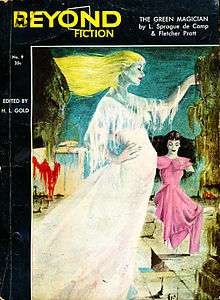Upon the Dull Earth

"Upon the Dull Earth" is a science fiction short story by Philip K. Dick, first published in November 1954 in Beyond Fantasy Fiction.
Plot summary
By offering up the blood of a lamb, Silvia, the protagonist of Upon the Dull Earth, is able to summon creatures she identifies as angels. She thinks that the creatures are her ancestors and she is sure that one day she will join them. At the same time, though, it is not clear whether the creatures are really good, as Silvia thinks, or wicked. Their behavior and their relation with Silvia scare the girl's relatives and Rick, her boyfriend. Rick thinks that Silvia's behavior is very dangerous, as "the white-winged giants ... can sear [her] to ash". During a quarrel with Rick, the girl accidentally cuts herself. Independently from her will, Silvia's blood summons the creatures. Unable to control their power, the angel-like giants burn Silvia's body and leave only "a brittle burned-out husk".
Unable to accept his lover's death, Rick tries to bring Silvia back, but in doing so he causes the degeneration and destruction of the world he lives in. The story also develops one of Dick's favorite themes, namely the definition of what is real. The reality we think we know well turns out to be insubstantial, due to Dick's use of multiple possible realities which ends up deconstructing the idea of reality itself. As it investigates these questions, first at an epistemological level and then at an ontological one, Upon the Dull Earth unfolds like a conventional horror plot. Rick manages to contact the light-creatures who apparently belong to a higher realm of being and he also manages to speak with Silvia. The girl now lives in the realm of the angel-like creatures, but she wants to come back and she explains that they made a mistake when they took her away. The creatures think that bringing Silvia back could be dangerous. Besides, Silvia explains that in order to come back she needs "some shape to enter" because there are no "material forms" in the higher continuum. She would have to take something from the human world, "something of clay".
At the end of the story, Silvia manages to come back, but the effects of her return are disastrous. As soon as she appears in front of Rick, Silvia realizes that something has gone wrong and that she has taken the place of someone else. In fact, she has taken her sister's body. There is a scene in which Rick sees Betty Lou (Silvia's sister) change and become Silvia, but it is just the beginning of the nightmare atmosphere which engulfs the story's ending. In fact, the process of transformation is not over. Slowly, every member of Silvia's family becomes Silvia. Rick runs away in a fright, but his body is destined to be invaded by Silvia, too. The girl has assumed the role of a revenant who invades the body and mind of any living person and spreads like a virus, a curse, leaving no hope for redemption. At the end of the story, after a useless flight, after he has seen service-station attendants, waitresses and common people change into Silvia before his very eyes, Rick looks at himself in a mirror and sees his face slowly becoming Silvia's. Suddenly, the man is gone and only Silvia remains. The girl finds herself alone and does not understand what has happened.
Themes
Old Testament allusions are littered throughout the story. The story assumes that many layers of reality exist, the higher the layer the more powerful it is. Silvia states that "the ladder ... seems to keep on going up and up. World after world". These statements constitute a kind of fantastic (not really science-fictional) explanation not only of creation but also of God's omnipotence. According to them, God is a being who belongs to a higher level of existence and who created other beings out of clay with his own hands. The universe of this story seems to be more influenced by gnosticism than by the Judeo-Christian religion, and the beings that looked like angels were probably not superior to Silvia. This is a horror story in the sense that it violates a Christian taboo. The taboo has to do with the assigned place of men in the natural and divine chain of being.
However, the New Testament theme of transmutation (from the ceremony of the eucharist where bread and wine represents the flesh and blood of Christ) might be the dominant one. This is a common theme in Dick's work, here carrying his characteristic gnostic twist where the transmutation goes awry under the hand of lesser divinity (the angels—in this tale they are ignorant and capricious, in many of Dick's works, especially the later ones, this divine figure is plainly malicious). The effect of this is that the entire world is transformed (transmuted) into a flawed, inhospitable form, mirroring the effect of Samael (the blind god) in gnosticism.
The title is taken from Proteus' ode to Silvia in Act 4 Scene 2 of Two Gentlemen of Verona by William Shakespeare:
- Then to Silvia let us sing,
- That Silvia is excelling;
- She excels each mortal thing
- Upon the dull earth dwelling:
- To her let us garlands bring.
Adaptations
Upon the Dull Earth was adapted into an audio drama, "Silvia's Blood," by The Truth (podcast).
References
- http://etc.dal.ca/belphegor/vol3_no2/articles/03_02_Bettan_TerPKD_en.html
- https://soundcloud.com/jonathan-mitchell-1/silvias-blood
External links
- Upon the Dull Earth title listing at the Internet Speculative Fiction Database